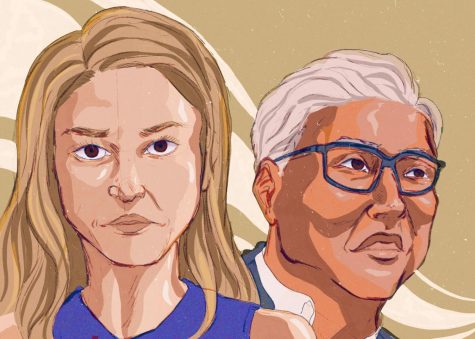Chicago Humanities Festival takes over Student Center for a day, hosts accomplished authors
October 28, 2021

The buzzing of college students occupying the Student Center was replaced last weekend by book lovers from across Chicago, eager to hear their favorite authors speak.
The book talks, hosted by the Chicago Humanities Festival, were held in a Q&A format and required proof of vaccination to attend. The event, held on Saturday, Oct. 23, highlighted the works of Broadway performer Sutton Foster, author of “Hooked: How Crafting Saved My Life,” along with award-winning writer, Amitav Ghosh, author of “The Nutmeg’s Curse: Parables for a Planet in Crisis.”
Throughout the events at the Student Center, 754 S. Wabash Ave., guest speakers were asked about their newly published books, what shaped them as writers, their upbringings and where they find inspiration.
Alison Cuddy, the Marilynn Thoma artistic director for the Chicago Humanities Festival and interviewer during Foster’s event, was excited to use the Student Center’s space in hopes to attract a broader audience.
“We love the new center at Columbia College Chicago for so many reasons,” Cuddy said in an email to the Chronicle. “Academic partnerships are important to our programming, and we hope our presence there might add another dimension to the students’ experience. The space is beautiful and designed to encourage conversation and hanging out, which are at the heart of the festival.”
Cuddy said she also enjoys using the Student Center venue because she hopes it will help bring different demographics of South Loop residents together.
“As we further develop our presence across Chicago, including in the South Loop, the center offers a great crossroads, where, through our programming and partnerships, members of the CCC community, neighborhood residents, and the general public can come together and learn from one another,” Cuddy said in the email.
Elizabeth Chatterjee, an assistant professor of environmental history at the University of Chicago, said she was looking forward to the event, because she is an avid reader of Ghosh’s literature, and took notes during the event in her copy of Ghosh’s book.
“I think [Ghosh] is one of the most exciting people working on the history of our present environmental crisis,” Chatterjee said. “I think he is doing work that is as cutting edge as anyone in my field.”
Chatterjee had heard Ghosh speak before at a different book talk of his several years back, but she was eager to hear him again.
“I think [Ghosh] is amazingly charismatic,” Chatterjee said. “I have seen him speak once before, in fact in Kolkata [India], in 2016.”
During Foster’s talk, she shared her inspirations for her book about self-care and struggles in her life, through the lens of crafting.
“Being an actress, I play a lot of characters, which is awesome and I love it,” Foster said. “I get to escape into all of these amazing worlds … but in real life, I am more of an introvert, and there is something about making something. I struggle now, too, that we’re so attached to our phones and screens, and there is something that is really satisfying about making something that exists, that’s real.”
In contrast to Foster’s introspective approach to writing, Ghosh alluded to finding inspiration in the untold stories of the world, as his book focuses on the origins of the climate crisis through the historical scope of Western society’s colonialism. It explores the role nutmeg played in the exploitation of people and the environment.
“The significance of the nutmeg for me is it becomes a way of trying to think of the agency of botanical entities … How do non-human entities create history?” Ghosh said. “That’s what I am trying to think about in this book: How do non-humans enter human history and human life.”







